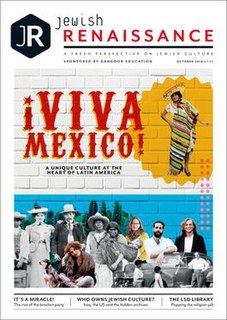 W
WJewish culture is the culture of the Jewish people, from its formation in ancient times until the current age. Judaism itself is not a faith-based religion, but orthoprax, pertaining to deed and practice. Jewish culture covers many aspects, including religion and worldviews, literature, media, and cinema, art and architecture, cuisine and traditional dress, attitudes to gender, marriage, and family, social customs and lifestyles, music and dance.
 W
WJewish secularism refers to secularism in a particularly Jewish context, denoting the definition of Jewishness without recourse to religion. Jewish Secularist ideologies first arose in the latter third of the 19th century, and reached the apogee of their influence in the interwar period.
 W
WThe Alliance israélite universelle is a Paris-based international Jewish organization founded in 1860 by the French statesman Adolphe Crémieux to safeguard the human rights of Jews around the world. The organization promotes the ideals of Jewish self-defense and self-sufficiency through education and professional development. It is noted for establishing French-language schools for Jewish children throughout the Mediterranean, Iran and the Ottoman Empire in the 19th and early 20th century.
 W
WJewish anarchism encompasses various expressions of anarchism within the Jewish community.
 W
WBeginning with the correspondence between Walter Benjamin and Gershom Scholem interpretations, speculations, and reactions to Kafka's Judaism became so substantial during the 20th century as to virtually constitute an entire minor literature. Meditations about how and to what extent Kafka anticipated or represented the incoming Holocaust of the European Jewry comprise a major component of most scholarship along these lines.
 W
WA Hanukkah bush is a bush or tree—real or simulated—that some North American Jewish families display in their homes for the duration of Hanukkah. It may, for all intents and purposes, be a Christmas tree without any Christianity-themed ornaments. It is associated with Chrismukkah.
 W
WJewish identity is the objective or subjective state of perceiving oneself as a Jew and as relating to being Jewish. Under a broader definition, Jewish identity does not depend on whether a person is regarded as a Jew by others, or by an external set of religious, or legal, or sociological norms. Jewish identity does not need to imply religious orthodoxy. Accordingly, Jewish identity can be cultural in nature. Jewish identity can involve ties to the Jewish community. Orthodox Judaism bases Jewishness on matrilineal descent. According to Jewish law (halacha), all those born of a Jewish mother are considered Jewish, regardless of personal beliefs or level of observance of Jewish law.
 W
WJewish humor is the long tradition of humor in Judaism dating back to the Torah and the Midrash from the ancient Middle East, but generally refers to the more recent stream of verbal and often anecdotal humor of Ashkenazi Jews which took root in the United States over the last hundred years, including in secular Jewish culture. European Jewish humor in its early form developed in the Jewish community of the Holy Roman Empire, with theological satire becoming a traditional way of clandestinely opposing Christianization.
 W
WJewish Renaissance is a quarterly cultural magazine, founded in October 2001, covering Jewish culture, arts and communities in Britain and beyond. It is edited by Rebecca Taylor, a former News Editor at Time Out London.
 W
WSince Biblical times, music has held an important role in many Jews' lives. Jewish music has been influenced by surrounding Gentile traditions and Jewish sources preserved over time. Jewish musical contributions on the other hand tend to reflect the cultures of the countries in which Jews live, the most notable examples being classical and popular music in the United States and Europe. However, other music is unique to particular Jewish communities, such as klezmer of Eastern Europe.
 W
WThe Organization for Jewish Colonization in Russia, commonly known by its transliterated acronym of ICOR, was a Communist-sponsored mass organization in North America devoted to supporting the settlement of Jews in new collective settlements, firstly in the newly established Ukrainian Soviet Republic and Southern Russia, and latterly in the Jewish socialist republic of Birobidzhan in the Soviet Union. The organization was founded in the United States in 1924 and soon spread to Canada.